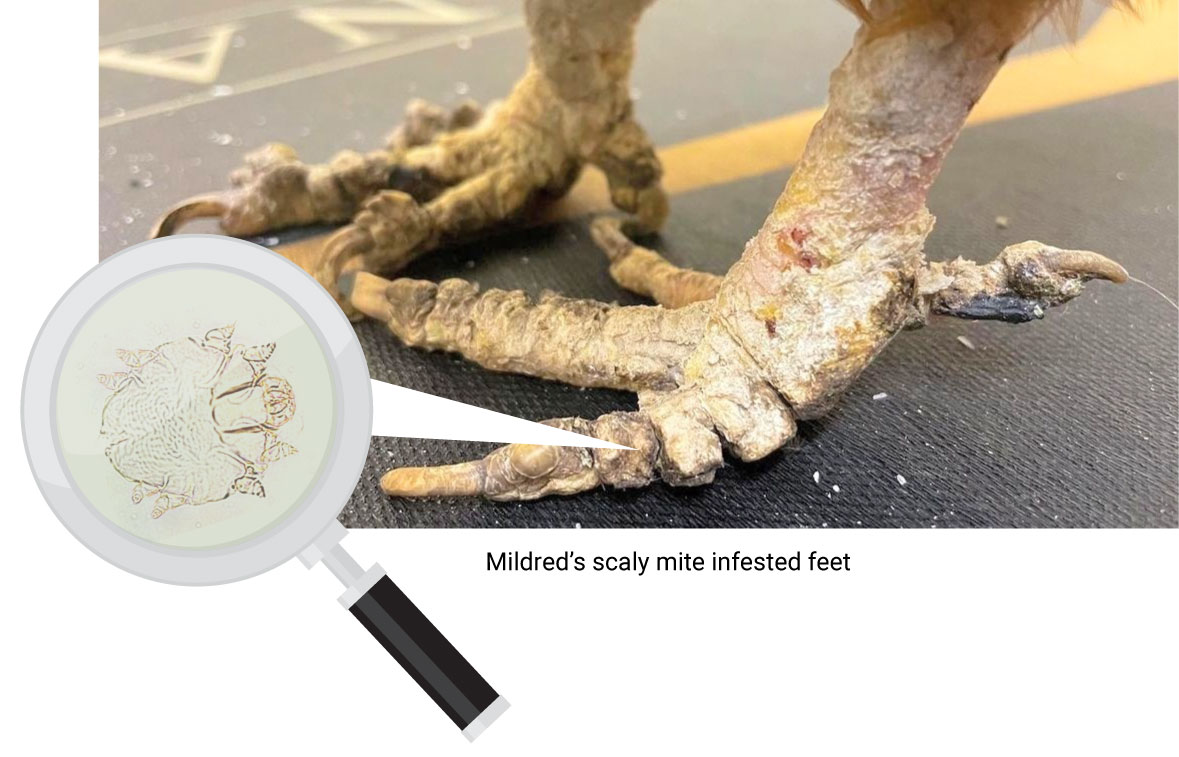Mildred is a 2.5-year-old hen who lives in a small backyard flock in Dublin, Ireland with two other hens. One day Mildred's owners noticed the hen appeared lame but could not figure out which leg was causing the problem. After several weeks of no improvement, Mildred was taken to
Raheny Veterinary Hospital.
Upon Mildred's arrival at the hospital, Dr. Bobby Ortiz asked her owners history questions about the hen, her flock, and the presenting issue. After giving Mildred a thorough physical examination, he thought the hen was in overall good health except for the condition of her limbs. A normal, healthy chicken should have smooth, bright, uniform scales on their legs and top of their feet. Both of Mildred's legs and feet were covered with an extensive amount of crusts, developing a ‘scaly leg’ appearance.
Since there are a few reasons why chickens can develop this condition, Dr. Ortiz performed a quick skin scrape to get a sample of the crusts from Mildred's feet. After examining the sample under a microscope, Dr. Ortiz confirmed that Mildred was infested with
Knemidocoptes mutans, otherwise known as the scaly leg mites.
Scaly leg mites burrow into the cornified epidermis of the chicken's skin, creating tunnels where they live out their entire lives. This tunneling action damages the tissue and causes the bird pain and discomfort. Left untreated, it can lead to loss of toes, lameness, and permanent deformation of the bird's feet. The compromised skin barrier also puts the chicken at an increased risk of secondary bacterial infections. The good news is that these mites generally respond well to treatment.
In early stages of infection, applying a thick layer of Petroleum jelly (Vaseline) or Paraffin oil on the chicken's legs and feet can suffocate the mites. However, for more severe infestations, treatments with ivermectin (mixed with propylene glycol) are needed.
Mildred’s infestation with scaly mites was advanced since it was impacting her ability to walk (chronic lameness). Therefore, Ortiz recommended that Mildred receive a course of treatment with ivermectin (three in total). Since the scaly mites are spread through direct contact, it was possible that Mildred’s flock mates were infested as well. Although the hens weren’t displaying active signs of being infested, Mildred’s owner was advised to still apply treatment as if they had an early-stage infection. Since the life cycle of the mites are 10-14 days, Mildred was kept isolated from the other birds for the next 1-2 weeks until all the mites were gone.
About Dr. Bobby Ortiz
Dr. Bobby Ortiz is an MVB Veterinary Surgeon who was born and raised in Southern California USA, Bobby Ortiz began his academic focus in animals studying Marine Biology at Hawaii Pacific University before completing his Veterinary Degree at University College Dublin. He has always shown a keen interest in exotics, especially birds and fish medicine. Since his start at Raheny Veterinary Hospital, he has further pursued his interests in surgery and is working to expanding the exotic-pet clientele. Bobby has a Brittany Spaniel named Bodhi here in Ireland and a Labrador cross rescue, named Kika, that lives at home with his family in California
Follow Dr. Bobby Ortiz on Instagram at
@dogtor_bob!

Raheny Veterinary Hospital has been providing veterinary services to pet owners throughout Northside for nearly 30 years. The hospital was founded in 1988 by Veterinary surgeon Patrick Keating with the aim of providing quality healthcare for the ever-increasing pet population in Raheny and the surrounding areas of North Dublin. The hospital offers a complete range of veterinary services to cater for all clients’ needs. These include routine services such as vaccinations and neutering as well as coming to the rescue in emergency situations by providing full medical and surgical care when your pet is unwell. The aim at the hospital has always been to provide quality veterinary services and support at affordable, competitive prices. There is a fully equipped operating theatre, in-house laboratory, ultrasound scanning, 24-hour emergency cover, pet health checks, dental treatments, ECG and blood pressure monitoring, endoscopy, x-ray facilities and cat boarding for clients’ cats. They stock a wide range of veterinary approved pet foods. As well as providing these key services, the practice also works with a number of animal rescue groups. Patrick and his staff all recognize and understand how dedicated owners are to the wellbeing of their pets. The highly skilled staff are on-hand to help you with any advice you need or queries you may have.
Follow them on social media:
